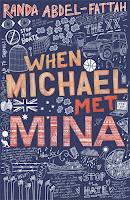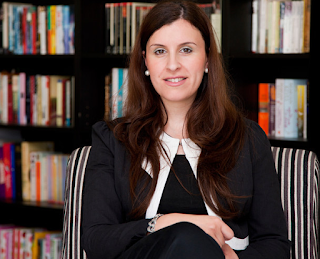 In the September edition of the North Melbourne Books newsletter we talk to Randa Abdel-Fattah about her new young adult novel, When Michael Met Mina.
In the September edition of the North Melbourne Books newsletter we talk to Randa Abdel-Fattah about her new young adult novel, When Michael Met Mina.It's a great story about two young people from very different worlds. Mina fled Afghanistan by boat to start a new life in Australia. Michael is a well-heeled, middle class teenager. His parents have started up the anti-refugee political movement, Aussie Values. When Mina wins a scholarship to Michael's elite private school, the two are bound to clash. Can they sort out their differences, even find love?
Teen romance, with a touch of Pride and Prejudice, meets heated contemporary Australian politics in this compelling novel.
To view the September edition of the North Melbourne Books newsletter, click here. To sign up for our newsletter, click here.
North Melbourne Books talks to Randa Abdel-Fattah
North Melbourne Books: In When Michael Met Mina, two teenagers from completely different worlds must try to sort out their intense political differences. Michael comes from a family whose parents have created an anti-immigration movement called Aussie Values. Mina escaped war torn Afghanistan by boat. When Mina wins a scholarship to Michael’s elite school, there is some gut wrenching conflict between them, but also a growing empathy for their respective situations. How did the idea for the story come to you?
Randa Abdel-Fattah: Just over three and a half years’ ago I quit law and started a PhD to explore racism in Australia. I wanted to unpack racism, specifically Islamophobia, from the point of view of its perpetrators. While I was conducting my fieldwork, interviewing people, attending anti-Islam and anti-refugee rallies, a character popped into my head. Well, two to be precise. One was a young Afghan refugee. A ‘boat person’ we see maligned and stigmatized by both sides of politics. Bright, fierce, courageous, scarred, she wouldn’t budge from my head. I thought about what it would mean for this young girl to have fled Afghanistan, grow up in Western Sydney, only for me to then throw her into a private school in the lower north shore of Sydney. I called her Mina. The other person who popped into my head at one of the rallies I was attending was a boy called Michael. As I interviewed people about their ‘fears of being swamped by boats’, about the ‘Islamisation of Australia’, about the so-called ‘clash of civilisations’, I wondered what it would mean to be a teenager growing up in a family peddling such racism and paranoia. How do you ‘unlearn’ racism? How do you find the courage to question your parents’ beliefs? How do you accept responsibility for learning about the world on your own terms? That’s when I decided to write a story that took these two characters, Michael and Mina, and threw them at each other.
NMB: The portrait of Michael’s family is very interesting. They’re not demonised in any way. Michael’s father and mother are educated, solidly middle-class and clearly very decent people. Yet their politics are tough and unyielding, attracting some very unsavoury characters. Was the writing of these characters difficult?
RAF: The greatest challenge was writing Michael’s parents. I didn’t want them to be racist caricatures. It was about finding the writing balance and tone and complexity, not reducing them to a one-dimensional racist stereotype. It was really important to write Michael’s parents in such a way that readers wouldn’t be able to dismiss them as ‘racist bogans’ or ‘far rights’. We often think of racism as something extreme, fringe, based on ignorance. This allows us to ignore the everyday, systemic racism. The racism expressed in polite, liberal, middle class circles. The racial logics that underlie many ‘reasonable’ sounding arguments. So I wanted my readers to recognise these arguments as grounded in the same racial logics and hopefully feel empowered to challenge them.
NMB: The book does a terrific job of capturing the male voice of Michael, his friends and milieu. How did you get the tone right?
RAF: I'm flattered you think so! Writing from a male perspective is something I've done throughout all my novels so I didn't feel I was doing anything particularly difficult. Getting the tone right is about constantly editing, reading dialogue aloud and then hoping it works!
NMB: How have readers responded so far?
RAF: I'm really thrilled by the response of my readers and reviewers. The responses have been overwhelmingly positive and really validated my sense that YA fiction can be a powerful and important genre for 'political writing'.
NMB: What books are you enjoying reading at the moment?
RAF: I just started reading Barracuda by Christos Tsiolkas. His writing is exquisite.
When Michael Met Mina, by Randa Abdel-Fattah. Published by Pan Australia RRP: $18.99

No comments:
Post a Comment